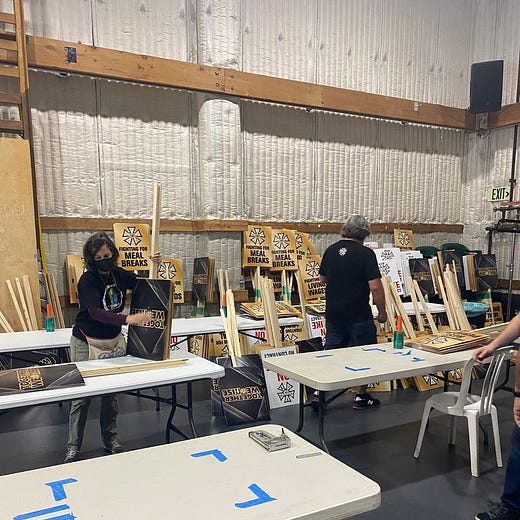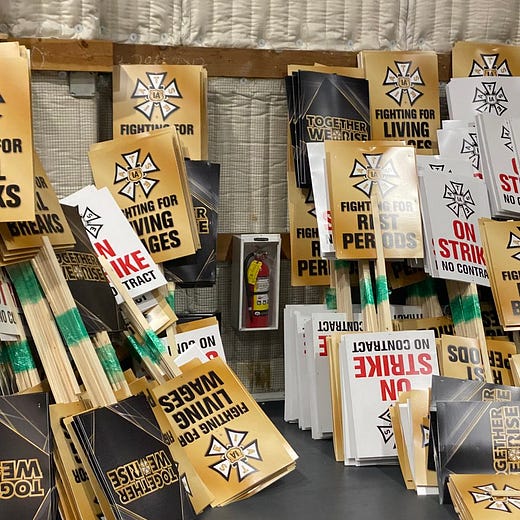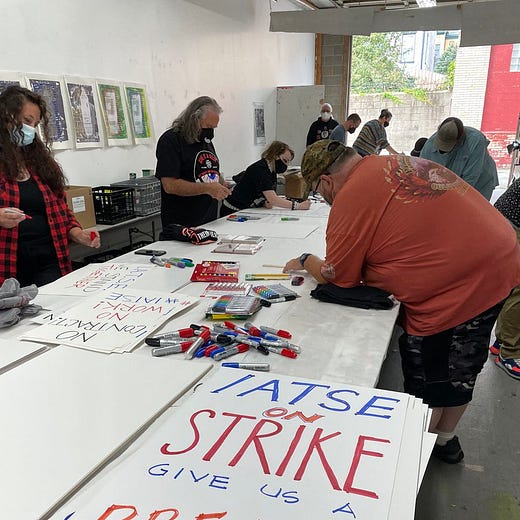The Strikewave Is Too Big to Ignore
Tens of thousands of workers are organized and demanding more—and they're willing to strike for it.
Not many stories in our political sphere make me feel optimistic anymore. But even at my most cynical, it's hard not to feel like we're living through a moment for the labor movement in America.
It feels like this recent uptick in organizing activity started with IATSE, the International Alliance of Theatrical Stage Employees, where an eye-popping 99 percent of 60,000-plus members voted to authorize a strike, citing concerns about inordinately long hours, no lunch breaks, and other indignities created by the pressures of ramped-up content creation for streaming services. They're now set to go on strike Monday unless a deal is reached in the next few days.
Meanwhile, here's a line that ABC News correspondent Terry Moran said on Good Morning America today: "For the first time in a long, long time, workers have the upper hand." Another line of his: "There is a new militant spirit in the American workforce."
Moran said this in a segment about 10,000 John Deere employees going on strike today, 24,000 Kaiser Permanente nurses and health care workers in California and Oregon voting to authorize a strike, and the ongoing strike at Kellogg's across four states, which began a week ago. It feels safe to say that Good Morning America, morning viewing for wine moms across the country, doesn't generally make it a habit to cover labor news, let alone in this fairly positive tone!! (Adding to my bemusement, the Today show also covered it!!!)
In Kentucky, more than 400 workers at a major distillery are entering their second month on strike:
It goes on and on and on. More than 1,000 coal miners in Alabama have now been on strike for a staggering seven months; in Washington, 2,000 carpenters went on strike last month. Pick a field and there's probably some labor action happening in the sector, as evidenced in the Guardian US:
Several other large groups of workers have voted to authorize strikes around the US while continuing new union contract negotiations, such as 2,000 Frontier Communications workers in California, transit workers in Beaumont, Texas, and Akron, Ohio, about 450 public works employees in Minneapolis, Minnesota, dining workers at Northwestern University, and hundreds of group home workers in Connecticut.
Graduate workers at Harvard and Columbia University are currently holding strike authorization votes and Illinois State University graduate workers have authorized the bargaining team to call for a strike vote.
In Connecticut, a small group of Dollar General employees are less than two weeks away from a vote to become the only unionized Dollar General store in America. They've faced a heated anti-union campaign, with corporate descending on the tiny store's workforce. As Hamilton Nolan noted over at In These Times, the only other successful union vote at a Dollar General store resulted in the location eventually being closed.
And over the summer, we saw that this labor militancy is working. After a 19-day strike at Frito Lay in July, workers won higher wages and a guaranteed one day off a week (feels absolutely insane, but this is America!). Last month, a weeks-long strike at Nabisco came to an end after workers won increased wages, a $5,000 bonus, and the company agreeing to double its 401(k) matching contributions.
We're living through extraordinary times, and workers are meeting the moment with extraordinary action. After more than a year of struggling through the pandemic, millions of workers saw their wages change not an iota. Meanwhile, compensation for executives still rose and the companies made heaps of money. You go on strike as a last resort, and American workers have been pushed beyond the breaking point for far too long. It's been made abundantly clear that employers will never willingly share the wealth or give their workers any concessions without us banding together and fighting for them.









